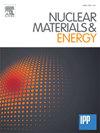评估用于核聚变应用的 CuCrFeV(Ti、Ta、W、Mo)的热特性
IF 2.3
2区 物理与天体物理
Q1 NUCLEAR SCIENCE & TECHNOLOGY
引用次数: 0
摘要
这项研究探讨了成分对高熵合金族 Cu5Cr35Fe35V20-X5 (at. %)热性能的影响,其中 X = Ti、Ta、W 或 Mo,其作用是在聚变反应堆中 W 基等离子体面元件与 CuCrZr 或 Cu 基散热元件之间形成热屏障。这些合金是通过电弧熔化生产的,其微观结构和机械性能先前已通过 XRD、SEM 和维氏硬度测量进行了表征。在 25 °C 至 600 °C 的温度范围内,使用激光闪光法测量了热处理合金的热性能,以确定热扩散率 α、热导率 λ 和比热 Cp。对于所有材料,热导率随温度的升高而增加,从 RT 时的 15 W/m-K 增加到 600 °C 时的 28 W/m-K,对于 Mo-HEA 和 W-HEA 来说,热导率与热处理的关系不大,但对于 Ta-HEA 和 Ti-HEA 来说,热导率在老化后会增加。这些值低于 W 的值(600 °C 时为 ∼122 W/m-K),也远低于 CuCrZr-IG 的值(400 °C 时为 ∼354 W/m-K)。这些 HEA 的热膨胀系数在整个工作温度范围内介于 CuCrZr 和 W 之间,在 RT 时为 ∼10 × 10-6 °C-1,在 650 °C 时为 ∼ 2 × 10-6 °C-1。这些结果表明,Cu5Cr35Fe35V20-X5(X = Ti、Ta、W、Mo)HEA 具有良好的热物理性能组合(λ、Cp 和 CTE),可在需要结合 W 基和 Cu 基材料的面向等离子体的部件中用作热障。本文章由计算机程序翻译,如有差异,请以英文原文为准。
Evaluation of thermal properties of CuCrFeV (Ti, Ta, W, Mo) for nuclear fusion applications
This work investigates the influence of composition on the thermal properties of the high entropy alloy family Cu5Cr35Fe35V20-X5 (at. %), where X = Ti, Ta, W or Mo in the framework of acting as a thermal barrier between the W-based plasma-facing elements and the CuCrZr or Cu-based heat sink components of the fusion reactor. The alloys were produced by arc melting and their microstructure and mechanical properties were previously characterized by XRD, SEM, and Vickers hardness measurements. Thermal properties have been measured on as-cast at thermally treated alloys using the laser flash method in the temperature range 25 °C to 600 °C to determine the thermal diffusivity, α, thermal conductivity, λ, and specific heat, Cp. Dilatometry experiments were also carried out to obtain the linear thermal expansion coefficient, CTE, as a function of temperature.
For all materials, the thermal conductivity increases with temperature from 15 W/m·K at RT to 28 W/m·K at 600 °C and does not significantly depend on the thermal treatment for the Mo-HEA and W-HEA, but increases after aging for the Ta-HEA and Ti-HEA. These values are lower than those of W (∼122 W/m·K at 600 °C) and much lower than for CuCrZr-IG (∼354 W/m·K at 400 °C). The thermal expansion coefficients of these HEAs, ∼10 × 10−6 °C−1 at RT and ∼ 2 × 10−6 °C−1 at 650 °C are between those of CuCrZr and the W for the entire operative temperature range. These results indicate that the Cu5Cr35Fe35V20-X5 (X = Ti, Ta, W, Mo) HEAs have a promising combination of the thermophysical properties, λ, Cp and CTE, to act as thermal barrier in plasma-facing components that require the union of W- and Cu-based materials.
求助全文
通过发布文献求助,成功后即可免费获取论文全文。
去求助
来源期刊

Nuclear Materials and Energy
Materials Science-Materials Science (miscellaneous)
CiteScore
3.70
自引率
15.40%
发文量
175
审稿时长
20 weeks
期刊介绍:
The open-access journal Nuclear Materials and Energy is devoted to the growing field of research for material application in the production of nuclear energy. Nuclear Materials and Energy publishes original research articles of up to 6 pages in length.
 求助内容:
求助内容: 应助结果提醒方式:
应助结果提醒方式:


